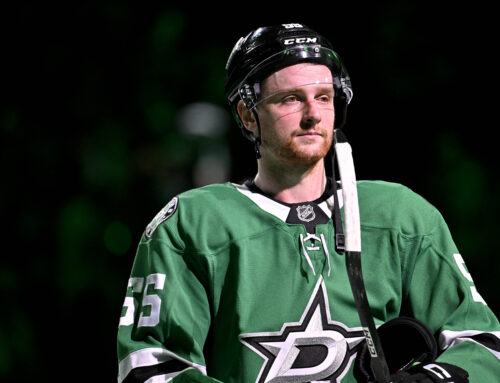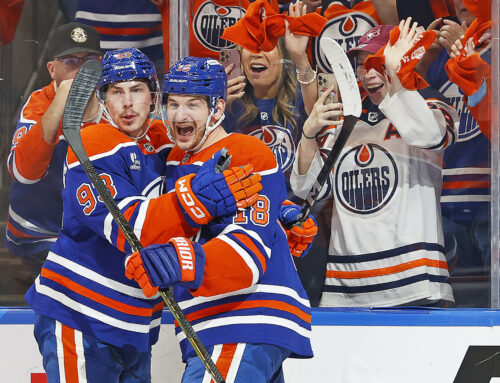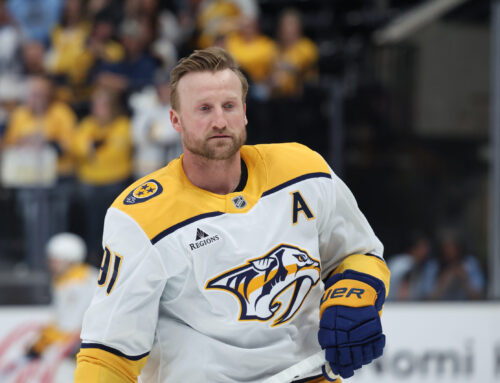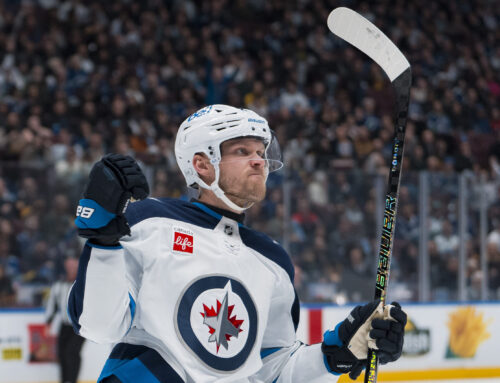
Taking a look at the “third” spot on the big lines in Anaheim/Dallas…
A great way to strike gold during a fantasy hockey season is to find the Golem to an already formidable duo of Samwise and Frodo. A spot on the top line with two established studs can drastically boost a player's fantasy value. That boost can take a player from being a fringe own to being a must own. Even with only even strength time, a player can see his production double or triple by landing a spot with an elite dynamic duo.
A strong recent example of this is the effect on Alex Burrows when he joined the Sedin twins. In Burrows' first 124 games he had 12 points, and three seasons later he had 67 points (including 35 goals) in 82 games. Landing the third spot on the Sedin line took Burrows from a fourth line goon to a repeated 50+ point 100+ penalty minute stud. Burrows struggled to get from ball hockey, to the ECHL, to the AHL and finally to the NHL; he could have been a fringe own in PIM counting leagues except he won the lottery and found himself skating with the Sedins.
There are two similar spots up for grabs in the Western Conference this year: one in Anaheim and one in Dallas. Finding the player that makes these duos into trios will help any fantasy team rocket up the standings. The trouble is that finding a player who will stay for an extended period of time can be difficult because of injuries, line shuffling or changing team dynamics.
Anaheim
The Candidates (Past and Present) 2012-14
|
With Getzlaf and Perry |
Without Getzlaf and Perry |
|||||||
|
Name |
Minutes |
GF20 |
GF% |
CF% |
Minutes |
GF20 |
GF% |
CF% |
|
490.83 |
1.39 |
71.55 |
51.71 |
722.08 |
0.78 |
57.71 |
52.01 |
|
|
254.99 |
1.45 |
74.33 |
43.34 |
771.18 |
0.64 |
50.05 |
47.15 |
|
|
234.83 |
1.40 |
60.13 |
54.90 |
949.55 |
0.90 |
55.59 |
47.14 |
|
|
Pat Maroon |
160.59 |
1.25 |
62.58 |
58.73 |
590.79 |
0.98 |
60.43 |
50.81 |
The benefits derived from playing alongside Getzlaf and Perry are obvious. For Beleskey and Penner, it doubled the number of even strength goals that they were on the ice for. For Penner, the split between his time in Anaheim and his time in Washington during the 2013-14 season is very telling. His on-ice shooting percentage went from 12.3% in Anaheim to 4.9% in Washington. Furthermore Penner went from an average of 2.1 points per 60 minutes, the second best rate of his career, to averaging 0.8 points per 60 minutes in Washington. Playing with Getzlaf and Perry basically tripled Penner's rate of point production. It is saying a lot when Getzlaf and Perry can make a guy relevant just after pancakes made him a laughing stock.
Matt Beleskey has been one of the biggest recent beneficiaries from plucking the cherry spot in the Anaheim lineup. When playing with Getzlaf/Perry, Beleskey is on the ice for almost 2.5 times as many goals as when he skates with other Ducks. In fact when Beleskey is alongside Getzlaf and Perry the ducks outscore their opponents 3 to 1. If it were not for his seemingly constant battle with injuries Beleskey would probably have an iron grip on this spot. This year Beleskey has found success on the second line with Ryan Kesler and Kyle Palmieri. His numbers on the second line this year are only slightly less impressive than the numbers he posts on the top line. On the second line Beleskey is on the ice for 1.141 goals per 20 minutes compared to 1.679 goals per 20 minutes on the top line. A lot of that success can be attributed to Beleskey's sterling 17.9% shooting percentage. The success Beleskey is having on the second line makes it less likely that he will find himself reunited with Getzlaf and Perry. However, his next injury may change everything.
Kyle Palmieri is a bit of an outlier in this group of four candidates for the top line in Anaheim. The other three candidates all generate shots at an above average rate from directly in front of the net while Palmieri generates shots from the same areas as Getzlaf and Perry higher up in the slot. Palmieri is also the only one of these four to have relatively consistent success away from the top line. As such Palmieri makes for a solid depth option to produce secondary offense. Much like Matt Beleskey, Kyle Palmieri has found success on Anaheim's second line this year with Kesler. As long as that second line continues to roll, spurred on by Beleskey's shooting percentage, do not expect to find Palmieri taking a regular shift on the top line.
Pat Maroon had success away from the top line last year but has been unable to replicate that success this year. Maroon over the last two years looked like the best option away from the Anaheim top line but getting stuck on a line with Tim Jackman and Nate Thompson has dampened Maroon's ability to drive play and produce at a high level while on a lower line. This is a massive fall from playing with Mathieu Perreault as he often did when not on the top line last year. This problem arises for Maroon this year when Perry is injured and Getzlaf plays with different types of players. When alone Getzlaf ends up with players like Emerson Etem or Devante Smith-Pelly, who generate shots from higher in the slot and play with more speed. Thus this year while Perry has been injured Pat Maroon has toiled on the fourth line with players who have not been a danger to score since peewee hockey. This illustrates the problem with trying to hold on to a sweet top line gig on a deep team. On teams with shallow talent pools, like the genetic pool of the royal family, holding on to the top line job is a lot easier as there is little in the way of other viable options.
There is a fifth option not seen in the table above: Rene Bourque. Since being acquired from Montreal the inconsistent Rene Bourque has seen a lot of time with Ryan Getzlaf though there has not been a lot of success in that time. While Bourque and Getzlaf have been on the ice together the Ducks have only averaged 0.815 goals per 20 minutes. While they have carried the balance of the scoring to the tune of 75%, this rate of scoring is 33.3 to 40% less than others have seen with Getzlaf and Perry. This does not bode well for Bourque staying on the top line long-term.
The best bet to grab the third spot on the top line, as long as Corey Perry is healthy, is Pat Maroon. Maroon fits the mold of the type of player Boudreau seems to want on the top line and has shown the ability to generate a rate of production in line with what is expected from a top line. While Perry is injured expect Maroon to struggle while wallowing in the misery that is the fourth line but expect big things when the Bourque experiment ends. Maroon should be a good buy low as soon as Perry returns to the lineup.
Dallas
|
With Seguin and Jamie Benn |
Without Seguin and Jamie Benn |
|||||||
|
Name |
Minutes |
GF20 |
GF% |
CF% |
Minutes |
GF20 |
GF% |
CF% |
|
597.65 |
1.44 |
72.82 |
51.83 |
443.96 |
0.32 |
31.57 |
48.98 |
|
|
202.99 |
1.52 |
67.45 |
52.20 |
513.17 |
0.49 |
40.30 |
47.65 |
|
|
142.7 |
1.47 |
55.13 |
50.45 |
250.49 |
0.84 |
41.91 |
51.75 |
|
|
82.78 |
1.93 |
88.9 |
51.39 |
259.91 |
0.77 |
44.50 |
49.25 |
|
|
59.87 |
1.17 |
53.70 |
59.50 |
222.39 |
0.76 |
54.77 |
51.20 |
|
The Dallas dynamic duo of Seguin and Jamie Benn are still very much in their honeymoon period. They may not have been a duo for as long as Getzlaf and Perry but they have been just as dangerous. Jamie Benn was a stud before Seguin arrived but both have stepped it up a notch since they became joined at the hip. Think of Seguin as the bacon that just makes everything better. The limited timeline for this partnership means that the sample sizes are predominantly a lot smaller than they were for Getzlaf and Perry. Despite being relatively new this duo is as dangerous as $2 drink night at the campus pub.
The third wheels for Seguin and Benn can be divided into last year's group and this year's. Last year brought the most intriguing option in massive Russian rookie Valeri Nichushkin. The prospect of Nichushkin playing with Seguin and Benn had poolies drooling heavier than a St. Bernard. Nichushkin came through as Dallas scored 72% of the goals when Nichushkin was on the top line and Nichushkin ended up on the ice for 1.44 goals per 20 minutes. Nichushkin, when away from Seguin and Benn, was a trainwreck though. This was probably because of Dallas's lack of quality depth last year. When Nichushkin skated on other lines Dallas got outscored three to one. That is a massive swing. You have to wonder how much Nichushkin was contributing to the top line given that kind of swing. With Nichushkin injured for much of the year the third spot on the top line has been up for grabs this year. Nichushkin may be a good long-term option here but will not have much value now.
Peverley reaped similar benefits to Nichushkin when on the top line. Peverley, before his heart issues, had slightly better numbers with and without the dynamic duo. The huge spike that Peverley experienced, and its similarity to Nichushkin's, lends some credence to Dallas' depth issues being a factor. Last year Dallas had a lot of role players but not much talent behind Seguin and Benn on the depth chart. Unlike in Anaheim, there did not seem to be a specific type of player that was being slotted on to the top line in Dallas. Other than Spezza the candidates for the top line tend to generate shots closer to the net but there is not was not an overwhelming trend in that regard. The trend that is developing this year is that the two most common third wheels on the top line, Spezza and Eakin, are centers. It would be logical to assume that this is because of Seguin's below average faceoff numbers except that Eakin's numbers in the dot are worse than Seguin's. Those two centers also happen to be the most successful candidates for the top line.
Jason Spezza does not fit the mold of the lesser player getting the massive bump from playing with two studs on the top line. Spezza has been a very studly player in his own right over the course of his career. Spezza has seen a significant bump to his production when playing on the top line but he has also been relatively successful helming the second line. The reason that Spezza will likely spend the bulk of the year on a separate line than Seguin and Benn is that he was brought in to provide secondary scoring. The aforementioned lack of depth last year that affected Peverley and Nichushkin was a problem Nill worked to address by bringing in Spezza and Hemsky, so to then play Spezza on the top line makes little sense – especially when there is an option on the Dallas roster who is incredibly successful when playing on the top line.
Cody Eakin has only recently started playing with Seguin and Benn with any regularity. The results have been spectacular to the point that there have been rumours of an epidemic of blindness in Dallas from looking too directly at this spectacular brightness that is this line. Eakin had solid numbers away from the top line but the Stars have been averaging close to two goals [W1] per 20 minutes when he skates on the top line. That's essentially a goal per game at even strength. Cody Eakin has 10 points thus far at even strength, and six of those have come with Benn and Seguin in less than 100 minutes. Six points in what amounts to approximately 10 games may not seem like anything special but that is a 50 point pace at even strength alone. Add a bit of added power play time as Eakin succeeds on the top line and this is the best case for a Burrows-type leap. Eakin has a better pedigree than Burrows did but he is getting a similar boost. As Seguin cools off and his 18% shooting percentage regresses to the norm, Eakin will cool off as well, but he still makes a great pickup as long as he is playing on the top line and he looks like a lock to stay there given the production Dallas is getting while he is there. What reason could there be to break up a line that outscores opponents four to one other than injury. Other than as an injury replacement there is little reason to discuss the last option, Colton Sceviour, given Eakin's success.
Conclusion
The two best options for these two prime spots look to be Pat Maroon and Cody Eakin. In Maroon's case he is the best fit for the type of player Anaheim likes to place beside Getzlaf and Perry. For Eakin it boils down to the amazing production speaking for itself. Jim Nill is a proponent of fancy stats and you can bet that he knows just how well Eakin, Seguin and Benn have performed. The big take away from this should be to look for situations where there are limited options. In Anaheim the depth they have has made the spot beside Getzlaf and Perry something of a revolving door. Players get bumped too readily from a spot on the top line because Anaheim has so many options that can get the job done. In situations like Anaheim's look for a preferred type of player to fill the spot on the top line. In Dallas a lack of depth negates a preference for any particular type of player and forces some options off the top line. With the injury to Nichushkin there just are not a lot of options to push Eakin to a lower line. Thus even if Eakin stumbles a bit he iswill be given another shot based on the success he has had thus far.
| Real or Imagined – Forwards Pt.2 (2014) | |||
| Real or Imagined – Forwards (2014) | |||
| Real or Imagined – Defensemen (2014) | |||
| Real or Imagined – Goalies (2014) |





 FLA
FLA EDM
EDM MIN
MIN BUF
BUF NYR
NYR CHI
CHI OTT
OTT L.A
L.A UTA
UTA MTL
MTL N.J
N.J NYI
NYI
